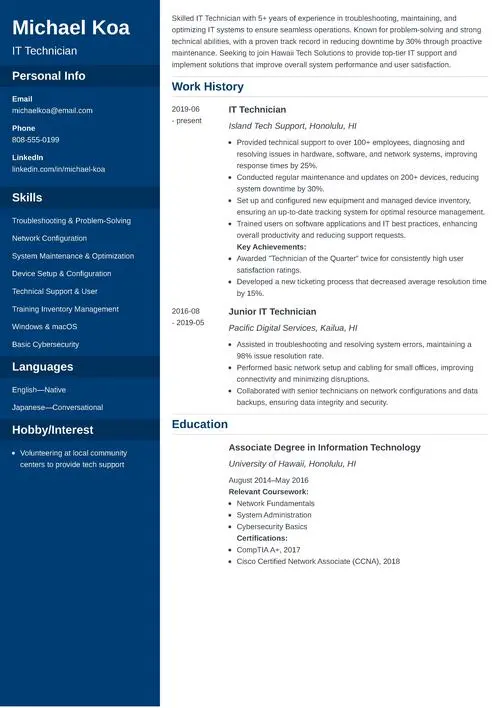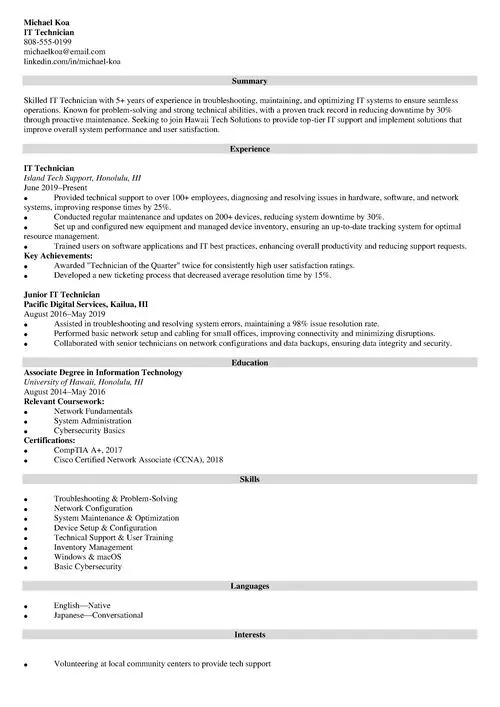Stretching the truth a bit might be tempting when your career is at stake. But is lying on a resume truly the best solution? What are the consequences of putting lies on your resume? And is it even legal? Read on and find out!
This guide will show you:
- If it’s legal to lie on a resume.
- What happens if you lie on your resume.
- Common examples of lying on resumes.
Want to save time and have your resume ready in 5 minutes? Try our resume builder. It’s fast and easy to use. Plus, you’ll get ready-made content to add with one click. See 20+ resume templates and create your resume here.
Sample resume made with our builder—See more resume examples here.
Want to avoid more mistakes when writing your resume? Visit our guides:
- Winning Resume
- The Best Resume Formats
- The Ultimate Resume Order
- The Crucial Parts of a Resume
- The Correct Resume Structure
- The Best Resume Styles
- Impressive Resume Headlines
- Resume Sections & Categories
- Resume Action Verbs
- Resume Examples for Any Job
Why Do People Lie on Their Resumes
Trying to find a job in today’s competitive job market can feel overwhelming and cause a lot of stress. With so many candidates and such fierce competition in almost every industry, it’s easy to see why some might think that padding their resumes is a necessary step to get ahead.
This temptation often originates from three main factors:
- Standing Out in the Application Process. According to our HR statistics report, each corporate job offer attracts 250 resumes. In large organizations, candidates might feel that they need to do something extraordinary to deliver a resume that stands out. This pressure can lead them to stretch the truth about their core competencies and relevant experience.
- Filling the Qualification Gap. Sometimes, candidates feel they are a perfect fit for a role but lack certain qualifications in the job description. These can include hard skills, especially technical skills, software knowledge, or an exaggerated education on a resume
- Fearing Unemployment. Did you know that 6.24 million people were unemployed in May 2024? The anxiety of not securing a job can drive individuals to lie on their resumes. This stress leads to people hoping that a few little untruths might increase their chances of landing a position they feel they wouldn’t land otherwise.
How Many People Lie on Their Resumes?
It's estimated that around 70% of people falsified information on their resumes. Additionally, 37% lie on their resumes frequently. Let's dive deeper into why they do it, how they do it, and what happens if their lies are detected.
Osayi Lasisi, a former HR director for a large organization, was the only “lenient” expert I found.
She says, “When I discover that someone has lied on their resume or in an interview, I look at how trivial or how serious the lie is and how it may impact the job function. The lie would make me question whether they are trustworthy people, however, it may also just reflect their desperation and desire for the position. I try to weigh the gravity of the situation based on the other circumstances when making a decision, and then observe them during the probation period.”
If you’re wondering what can you do to boost your chances of impressing a recruiter with your resume, visit our guide: How to Write a Resume
How Do People Lie on Resumes
When people lie on their resumes, they use two types of lies: lies of commission, which actively use false information, and lies of omission, which depend on misleading by avoiding relevant information. When it comes to official documents such as resumes, both telling a lie and hiding the truth are considered lying.
Here are some common examples of lying on resumes:
- Overstating job responsibilities and relevant achievements
- Broadening the scope of previous responsibilities
- Enhancing job titles to make previous roles sound more senior or impactful
- Lying about the number of employees managed in previous roles
- Hiding employment gaps orchanging employment dates to give an illusion of a more continuous work experience
- Using a different name of a previous employer to obscure a less prestigious work history.
- Claiming degrees not earned or listing a falsely higher level of education
- Faking your skill efficiency to appear more qualified for the job
- Misleading about your language skills, listing languages you don’t speak, or increasing your proficiency level
- Failing to disclose relevant criminal records when directly asked
- Adding fake hobbies or interests that prove the soft skills required by the company and better align with the company culture or the role
- Falsifying awards or recognitions received
- Stating that you’ve received a particular certificate or license
If you haven’t graduated yet, you don’t have to lie about it on a resume. See this guide and learn how to explain it to your recruiter: How to Put Unfinished College Degree on a Resume
How Employers Detect Dishonesty
The biggest fear of people lying on their resumes is undoubtedly employers uncovering their lies. They use several methods to determine whether a candidate is lying on a resume.
Here are some common techniques your recruiters use to detect lies on a resume:
- Contacting your previous employers and hiring managers to verify job titles and dates of employment and check job duties
- Conducting background checks to reveal criminal records, confirm educational achievements, and provide details of other personal history
- Contacting people you have given as your references on a resume to verify if there are no inconsistencies or exaggerations
- Running practical tests during the hiring process to reveal the truth about a candidate’s skills and relevant experience
- Confirming degrees and certifications with educational institutions or through third-party services
- Googling your name because a simple online search can uncover contradictions in your professional history
I asked Matthew Burr, of Burr Consulting, what he would do after finding out that an applicant lied to him:
“It's over after that, I don't have the time or patience to deal with someone lying to me during an interview or hiring process. We are investing in someone for a career, regardless of the level. I've been involved in two situations (both HR hires) that lied about levels of education, in both cases we did not hire. Catching someone in a lie is easy if you do your homework.”
Your recruiter will surely visit your LinkedIn profile. Make sure everything is up to date. Visit our guide: How to Verify Your Online Presence
Making a resume with our builder is incredibly simple. Follow our step-by-step guide, use ready-made content tailored to your job and have a resume ready in minutes.
When you’re done, Zety’s resume builder will score your resume and our resume checker will tell you exactly how to make it better.
Is It Illegal to Lie on a Resume? What Can Happen If You Lie?
Let’s get this straight: Lying on a resume is generally not considered a crime. However, the consequences can be severe, ranging from legal issues to significant damage to your professional reputation. In some cases, it can even lead to civil lawsuits or criminal charges, such as fraud.
Legal and Professional Implications of Lying on a Resume
- Misrepresentation—As I’ve mentioned before, lying on a resume isn’t a crime, but providing misleading information can lead to legal trouble, including fraud charges if you get a job under false pretenses.
- Employment Contracts—Most contracts include clauses about the accuracy of the information you provide. If your recruiter detects any lies, you could be fired immediately.
- Regulated Professions—In some industries (medicine, law, finance), falsifying credentials can lead to losing your license and facing legal action.
- Fraud Charges—Serious lies, like faking a degree or professional license, can result in fraud charges.
- Civil Lawsuits—Employers might sue you for damages if your lies cause financial loss or harm their reputation.
Besides legal issues, lying on a resume can also seriously impact you ethically and professionally.
Ethical and Professional Consequences
- Loss of Trust—Dishonesty can immediately disqualify you and damage your professional reputation.
- Job Termination—Lying on a resume can get you fired and damage your reputation.
- Harm to Employer’s Reputation—Falsifying your resume can hurt the company’s reputation, leading to potential legal actions against you.
- Difficulty Finding Future Jobs—A history of dishonesty makes it harder to get hired by other employers, especially in small industries and close communities.
- Personal and Financial Stress—Losing a job due to lying can cause serious financial and personal stress.
- Long-Term Career Impact—The fallout from lying can limit your future career growth and opportunities.
“Finding out that someone has lied can plant very serious doubts in the minds of the interviewer. What else would they lie about if they actually got the job? Just how trustworthy are these people? Enough of these questions can arise put enough doubt in the interviewer’s mind that they may decide to eliminate the candidate from the process, altogether,” says Steve Pritchard, HR Consultant for Ben Sherman.
While lying on a resume may not always be illegal, the potential legal, ethical, and professional consequences make it a highly risky and unwise practice. Honesty remains the best policy for building a successful and sustainable career.
Pro Tip: Focus on continuous improvement to boost your career without lying. Keep a detailed record of your achievements to avoid unintentional mistakes on your resume. Take relevant courses, seek feedback, and stay open to learning—employers appreciate candidates who show a commitment to growth.
The Power of a Genuine Resume
Now that you know everything there is to know about lying on a resume, let’s find out how you can avoid it while still impressing your recruiter. The short answer: by crafting a compelling resume without faking anything.
Here’s a longer answer, consisting of some tips to help you build a strong, honest resume:
- Write about your key accomplishments and not your job duties, and use quantifiable metrics to showcase your successes.
- Tailor your resume for each job application by emphasizing the experiences and skills most relevant to the specific role you are applying for.
- Incorporate resume keywords from the job description to pass the applicant tracking systems (ATS).
- Highlight your transferable skills relevant to the job you’re applying for.
- Include courses, workshops, licenses and certifications relevant to the job. Ensure your document is highly readable with a clean resume layout.
- Use your professional network to gain insights into the hiring process and gather recommendations.
- Practice common interview questions and articulate how your experiences align with the job requirements.
- Utilize modern resume builders to create a polished and professional resume.
Pro Tip: A well-written cover letter will provide context to your qualifications. It’s a great opportunity to explain in detail why you’re interested in the role and why you’re the perfect fit. Avoid repeating information that’s already in your resume and highlight your what’s the most relevant to the job you’re after.
Plus, a great cover letter that matches your resume will give you an advantage over other candidates. You can write it in our cover letter builder here. Here's what it may look like:
See more cover letter templates and start writing.
Key Takeaway
Lying on a resume isn’t illegal. That being said, the potential consequences of getting caught are severe. That’s why I always advise against lying on a resume. Especially since there are so many other ways of impressing a recruiter.
Remember, honesty is the best policy. Write a genuine resume to build a foundation of trust with your potential employer. Create a great resume profile, highlight your achievements, and list your key skills while finding resume keywords in the job ad. Keep learning and improving, and you will find a great job. I guarantee you that. Good luck!
About Zety’s Editorial Process
This article has been reviewed by our editorial team to make sure it follows Zety's editorial guidelines. We’re committed to sharing our expertise and giving you trustworthy career advice tailored to your needs. High-quality content is what brings over 40 million readers to our site every year. But we don't stop there. Our team conducts original research to understand the job market better, and we pride ourselves on being quoted by top universities and prime media outlets from around the world.





